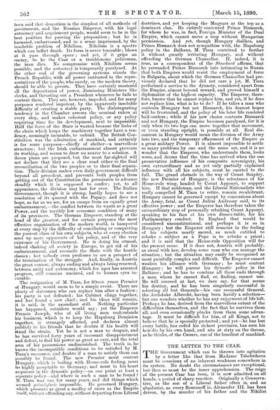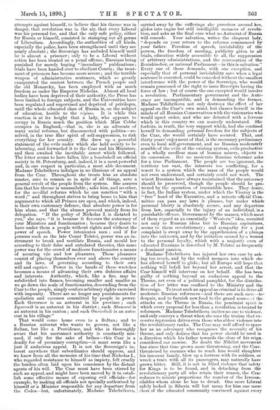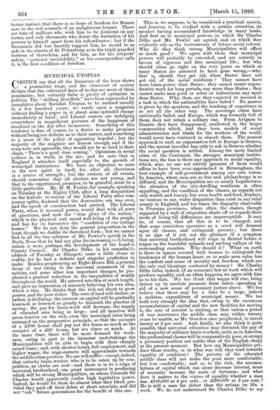THE LETTER TO THE CZAR. T HE Government which can be
thrown into agitation by a letter like that from Madame Tshebrikova must be conscious of an inherent weakness somewhere in its system. No doubt the circumstances are exceptional, but then so must be the inner apprehension. The reign of the present Czar has been, it is now admitted on all hands, a period of sharp reaction. Originally a Conserva- tive, as the son of a Liberal father often is, and an absolutist, as every Romanoff is, Alexander LEL has been driven, lay _the murder of his father and the Nihilist attempts against himself, to believe that his throne was in danger, that revolution was in the air, that every Liberal was his personal foe, and that the only safe policy, either for Russia or himself, consisted in stamping out all germs of Liberalism. Accordingly, the authorities of all kinds, especially the police, have been strengthened, until they are nearly absolute ; the Sovereign has secluded himself until he is almost a prisoner ; only to be a Liberal without action has been treated as a penal offence, Russians being punished for merely baying " incendiary " publications ; trials have been handed over to obedient Courts ; the treat- ment of prisoners has become more severe ; and the terrible weapon of administrative sentences, which so greatly exasperated the contest between the French people and the old Monarchy, has been employed with as much freedom as under the Emperor Nicholas. Almost all local bodies have been deprived of their authority, the Press has been limited to foreign subjects, and the Universities have been regulated and supervised and deprived of privileges, until the whole educated class of Russia is, on the subject of education, hostile to the regime. It is while this reaction is at its height that a lady, who appears to occupy in Russia much the position which Miss Cobbe occupies in England,—that is, she is an advocate of many social reforms, but disconnected with politics—re- solved, in the true Slav spirit of self-suppression, to risk everything for her country. She drew up a powerful statement of the evils under which she held society to be labouring, and forwarded it to the Czar and his Ministers, and then awaited the inevitable arrest which followed. The letter seems to have fallen like a bombshell on official society in St. Petersburg, and, indeed, it is a most powerful and, in one respect in particular, a most able document. Madame Tshebrikova indulges in no illusions of an appeal from the Czar. Throughout she treats him as absolute master, sure to remain so in spite of all things, save a general revolt of the people from the system. She assures him that his throne is unassailable ; asks him, and no other, for the needful reforms which he can sanction " with a word ;" and throughout strives to bring home to him that argument to which all Princes are open, and which, indeed, is their own customary defence, that absolute power is for him alone, and that the abuses proceed mainly from its delegation. " If the policy of Nicholas I. is dictated to you," she says, " it is because it favours the autocracy of your Ministers and functionaries ; because they desire to have under them a people without rights and without the power of speech. Power intoxicates men ; and if for persons such as the late Count Tolstoi, power was an in- strument to break and mutilate Russia, and mould her according to their false and antedated theories, this same power was for the crowd of mediocre functionaries a means of securing vile and low pleasures. These pleasures consist of placing themselves over and above the country and its laws, of governing according to their own will and caprice. Power in the hands of these wretches becomes a means of advancing their own dubious affairs and interests. Authority, which, like a fire, may be subdivided into flames, becoming smaller and smaller as we go down the scale of functionaries, descending from the Czar to the people, simply confers arbitrary rights exercised with impunity. There are no longer any punishments for spoliation and excesses committed by people in power. Each Governor is an autocrat in his province ; each Ispravnik is an autocrat in his district ; each Stanovoi is an autocrat in his canton ; and each Ouriadnik is an auto- crat in his village." That would come home even to a Sultan; and to a Russian autocrat who wants to govern, not like a Sultan, but like a Providence, and who is thoroughly aware that his sacrosanct authority is constantly mis- used, if only for the sake of bribes—this Czar is a deadly foe of pecuniary corruption—it must seem like a just if audacious appeal. It is not the Sovereign's in- terest anywhere that subordinates should oppress, and we know from all the memoirs of his time that Nicholas I., who regarded resistance to himself as impiety, felt cruelly the burden often laid upon his conscience by the distant agents of his will. The Czar must have been stirred by such an appeal, and might have been moved by it to estab- lish some effective means of exposing evil officials—for example, by making all officials not specially authorised by himself or a Minister responsible for any departure from the Codes—but, unfortunately, Madame Tshebrikova, mined away by the sufferings she perceives around her, glides into vague but still intelligible menaces of revolu- tion, and asks as the final cure what no Autocrat of Russia will concede. Your salvation, writes the eloquent lull, "depends on your return to the reforms commenced bf your father. Freedbm of speech, inviolability of the person, the freedom of meeting, publicity given to all trials, education widely accessible to all, the suppression of arbitrary administrations, and the convocation of the. Zeniskisobor, or national Parliament—in this is salvation." Every one of these demands, with one exception, and especially that of personal inviolability save when a legal sentence is executed, could be conceded without the smallest interference with the power of the Sovereign, who would remain possessed of the right to issue Rescripts having the force of law ; but of course the one excepted would involve a revolution. Parliamentary government and the Autco cracy are incompatible, and in demanding the former, Madame Tshibrikova not only destroys the effect of her appeal on the Czar's own mind, but classes herself in the minds of all Russian Conservatives with the visionaries who. would upset order, and who are detested with a fervour which in this country we can scarcely understand. She forfeits, in truth, the very support which, had she confined herself to demanding personal freedom for the subjects of the Czar, she would certainly have secured. That, and thirty years' enjoyment of that, is the necessary preliminary even to local• self-government, and no Russian moderately sensible of the evils of the existing system, evils productive of a wholly needless mass of human misery, objects to its concession. But no moderate Russian reformer asks for a true Parliament. The people are too ignorant, the territory too vast, the interests too conflicting, for a. resort to• a system which the mass of the people would not even understand, and certainly could not work. The wisest Russians have always maintained that the autocracy should be preserved, though the people should be pro- tected by the operation of irresistible laws. They desire, in fact, the Indian system, under which the Viceroy is the " free " head of the Executive, and a minute official Com- mittee can pass any laws it pleases, but under which. personal liberty is absolutely secure, and any departure from law, especially to the injury of an individual, is .a, punishable offence. Government by the masses, which most of them regard as an essentially " Western " idea, unsuited not only to Russian ideas but to Russian aspirations„ seems to them revolutionary ; and sympathy for a just complaint is swept away by the apprehension of a plunge into the unknown, and by the irritation caused by a wound to the personal loyalty, which with a majority even -of educated Russians is described by M. Tolstoi as frequently a dominant passion.
Madame Tshebrikova has injured her own case by ask- ing too much, and by the veiled menaces into which she has allowed herself to glide ; but all Europe will hope that nothing will befall her beyond her arrest, and that - the Czar himself will intervene on her behalf. She has been guilty of nothing beyond an audacious appeal to the- Throne, not even of a political pamphlet, for the distribu- tion of her letter was confined to the Ministry and- the Sovereign. To treat such an appeal as criminal is to drive all moderate Russian reformers—and there are such men—to, despair, and to furnish newfood to the grand source of the attacks on the Throne in Russia, the pessimist spirit in- which every proposal for less than a revolution is treated by reformers. Madame Tshebrikova incites no one to violence, and only conveys a threat when she uses the truism that ex- cessive repression drives even those who abhor violence into the revolutionary ranks. The Czar may well afford to spare her as an adversary who recognises the necessity of his throne, and only desires that his power should be used in a direction which his father towards the close of his reign. considered not unwise. No doubt the Nihilist movement has since that time grown more threatening, and the Czar, threatened by enemies who to reach him would slaughter his innocent family, blow up a fortress with its soldiers, or wreck a train with all its passengers, may naturally have grown bitter. Still, it is not in blind violence that safety for Kings is to be found, and in detaching from the revolutionary party all who retain their reason, the Czar reduces to minute proportions the number of the Irrecon- cilables whom alone he has to dread. One more Liberal safely locked in Siberia will but mean for him one more class of the educated community convinced against every better instinct that there is no hope of freedom for Russia save in the evil counsels of an unrighteous despair. There are tens of millions who wish him to be Autocrat on any terms, and only thousands who desire the limitation of his powers to himself apart from his subordinates ; but if the thousands did but heartily support him, he would be as safe in the streets of St. Petersburg as in his triply guarded fortress of Gatschina, and for him, as for his subjects' safety, " personal inviolability," as his correspondent calls it, is the first condition of freedom.








































 Previous page
Previous page